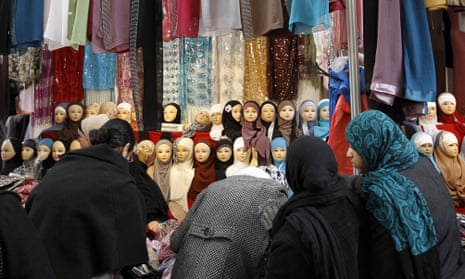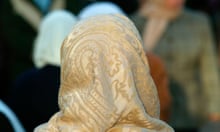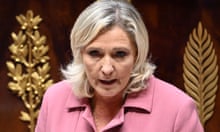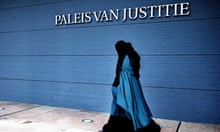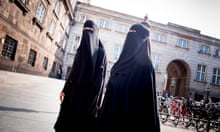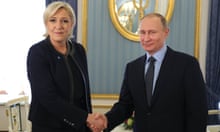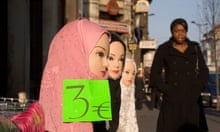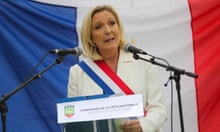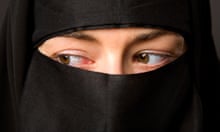Politicians on the right have welcomed a ruling by the EU’s highest court that allows companies to ban staff from wearing visible religious symbols, as a long-awaited legal judgment ricocheted into the French and Dutch election campaigns.
In its first decision on the issue of women wearing Islamic headscarves at work, the European court of justice in Luxembourg ruled the garments could be banned, but only as part of a general policy barring all religious and political symbols.
Nor can customers simply demand workers remove headscarves if the company has no policy barring religious symbols, the court ruled on Tuesday.
The long-awaited ruling came on the eve of Dutch elections, where Muslim immigration has been a contentious issue. In France, where the race to succeed President François Hollande remains wide open, politicians on the right seized on the issue.
François Fillon, the presidential candidate who has taken a hardline stance on Islam’s place in France, welcomed the judgment. On the day he was placed under formal investigation for misuse of public funds he said in a statement that it was “an immense relief, not just for thousands of companies but also for their workers”. He said the ruling would be “a factor in cohesion and social peace”, particularly in France.
Gilbert Collard, an MP for the Rassemblement Bleu Marine, which supports Marine Le Pen’s Front National, claimed the ruling was an endorsement. “Even the ECJ votes Marine,” he wrote on Twitter.
In Germany, the rightwing populist party, Alternative für Deutschland, also welcomed the ruling: “The ECJ’s ruling sends out the right signal, especially for Germany,” said the AfD’s Berlin leader, Georg Pazderski. “Of course companies have to be allowed to ban the wearing of headscarves.”
The ECJ issued a joint judgment in the cases of two women, from France and Belgium, who were dismissed for refusing to remove headscarves.
“An internal rule of an undertaking which prohibits the visible wearing of any political, philosophical or religious sign does not constitute direct discrimination,” the court said.
It ruled that a company’s wish to project a neutral image was legitimate and allowed internal rules banning political, philosophical or religious symbols.
The first case was referred to the ECJ by the Belgian courts. Samira Achbita had been a receptionist for the Belgian branch of G4S, the London-listed outsourcing and security company when, after three years at the firm she decided she wanted to start wearing a headscarf at work for religious reasons. Achbita was fired in June 2006 for refusing to take off her scarf. The company said she had broken unwritten rules prohibiting religious symbols.
In the second case, Asma Bougnaoui, a design engineer, was fired from an IT consultancy firm, Micropole, after a customer complained that his staff had been “embarrassed” by her headscarf while she was on their premises to give advice. She had been told before taking the job that wearing a headscarf might pose problems for the company’s customers.
In Achbita’s case the ECJ followed the advice of a senior legal adviser to the court, who argued that companies should be allowed to have policies banning the wearing of religious and political symbols.
“The court of justice finds that G4S’s internal rule refers to the wearing of visible signs of political, philosophical or religious beliefs and therefore covers any manifestation of such beliefs without distinction. The rule thus treats all employees to the undertaking in the same way, notably by requiring them, generally and without any differentiation, to dress neutrally.”
In Bougnaoui’s case the court’s adviser had ruled that she had suffered discrimination. She had been “professionally competent” and sacked only because she had refused to remove her headscarf, the advocate general advised.
The court upheld this view with a less ringing endorsement. It said customers’ wishes not to be served by a worker wearing a headscarf did not give companies a get-out clause from EU anti-discrimination law.
“However, in the absence of such a rule, the willingness of an employer to take account of the wishes of a customer no longer to have the employer’s services provided by a worker wearing an Islamic headscarf cannot be considered an occupational requirement that could rule out discrimination.”
The ECJ did not rule on whether Bougnaoui’s dismissal was based on her failure to observe company policies, saying this was a matter for the French court to determine.

The German broadsheet Süddeutsche Zeitung predicted that the ruling would fundamentally change how German courts assess similar cases, because the assumption since 2002 had been that religious symbols could not be banned from the workplace on anything other than safety grounds.
The ruling, which is more nuanced than a straightforward ban, could sow confusion about which religious symbols can be worn at work. Some legal experts said it seemed to cut against a ruling from the European court of human rights (ECHR) that allowed crosses to be worn.
Steve Peers, a professor of EU law at Essex University, said the latest ECJ ruling looked awkward when set against the ECHR judgment that wearing religious symbols is “sometimes an employee’s right to manifest freedom of religion”. He said the ECJ had not referred to this case law or attempted to deal with the distinction between freedom of religion and non-discrimination.
The ECHR is the high court of the 47-member Council of Europe and not part of the EU. Traditionally, the EU court in Luxembourg confined itself to evening out distortions in Europe’s single market, but its remit has grown as EU law has expanded.
The ruling prompted dismay from some religious groups. The Conference of European Rabbis, which comprises 700 Jewish leaders across Europe, said Europe was sending a clear message that its faith communities were no longer welcome. Referring to the rise of racially motivated incidents, Pinchas Goldschmidt, the group’s president, called on politicians to ensure Europe did not isolate religious minorities.
Maryam H’madoun at the Open Society Justice Initiative said she was disappointed by the ruling, which she described as discrimination against people who chose to show their religion in their dress.
“It will lead to Muslim women being discriminated in the workplace, but also Jewish men who wear kippas, Sikh men who wear turbans, people who wear crosses. It affects all of them, but disproportionately Muslim women,” she said.
Stephen Evans, the campaigns director at the National Secular Society in the UK, said: “Where a ban on employees wearing religious or political symbols is founded on a general company rule of religious and political neutrality, and where that rule is applied equally to all, it can’t be realistically argued that that this constitutes ‘less favourable treatment’.
“Religious and political neutrality is a perfectly reasonable aim and, where businesses and organisations wish to present themselves in such a way, this ruling demonstrates that this approach is perfectly consistent with equality and human rights law.”
Angelique Chrisafis contributed to this report
